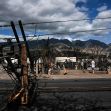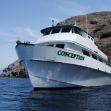Five people injured in a rooftop fire at Navy Pier are suing the operator of the Sable Hotel and its restaurants, claiming the company failed to ensure guest safety during a private corporate event where an employee allegedly poured a flammable liquid onto an open flame.
The complaint, filed in the Circuit Court of Cook County on October 28, names Maverick Hotels and Restaurants, LLC, and general manager Laurent Boisdrón as defendants. The guests, identified as Kira Bond, Peter Gianaris, Fernando Ramirez, Lisa Segner, and Philip Segner, allege that the company and its manager were negligent in connection with the September 24, 2025, fire at Offshore Rooftop, a restaurant inside the Sable Hotel at Navy Pier in Chicago.
According to the complaint, Maverick Hotels and Restaurants hosted a private corporate event where employees set up a food station for guests to roast marshmallows. During the event, one of the company’s employees allegedly poured a combustible accelerant onto the open flame, igniting a fire that caused burns and emotional trauma to several attendees. The injured guests claim the company failed to properly supervise staff, secure the area, or warn participants about the danger of using accelerants near open flames.
The group argues that Maverick Hotels and Restaurants and its general manager had a legal duty to provide a safe environment for guests, and that this duty was breached when staff created a hazardous condition that foreseeably caused harm.
Several claims rely on the doctrine of respondeat superior, which holds an employer responsible for the wrongful acts of its employees when those acts occur within the scope of their job duties. The principle is based on the idea that businesses benefit from their employees’ work and therefore must take responsibility when negligence occurs during that work.
Other counts allege negligent infliction of emotional distress, which allows individuals to recover for emotional harm caused by experiencing or witnessing a traumatic event. Illinois law applies the “zone of danger” standard, meaning a person may recover emotional damages if they were close enough to a dangerous situation to reasonably fear for their own safety.
The complaint also includes a loss of consortium claim from Philip Segner, who seeks compensation for the loss of companionship and support resulting from his wife’s injuries.
Under Illinois premises liability law, property owners and business operators must use reasonable care to keep their premises safe for visitors. This includes identifying hazards, training staff on safe procedures, and ensuring that flammable materials are handled properly. Courts have found that failing to prevent or warn against obvious risks, such as using alcohol or other fuels near an open flame, can amount to negligence.
Businesses that host public or private events involving open fires or heating elements, such as s’mores or fondue stations, are held to especially high safety standards because the risks of burns and flash fires are well known in the hospitality industry.
Maverick Hotels and Restaurants operates hospitality properties across the United States. The lawsuit asks the court to award damages for medical costs, emotional distress, and the lasting effects of the Navy Pier fire.






